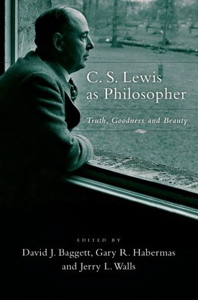
Author
David J. Baggett; Gary R. Habermas; Jerry L. Walls (Editors)
Summary
What did C. S. Lewis think about truth, goodness and beauty?
Here are fifteen essays that explore three major philosophical themes from the writings of Lewis. David J. Baggett, Gary R. Habermas and Jerry L. Walls edit this overview of Lewis’s philosophical thinking on arguments for Christianity, the character of God, theodicy, moral goodness, heaven and hell, a theory of literature and the place of the imagination.
Table of Contents
I. Truth
- Lewis’s Philosophy of Truth, Goodness and Beauty
Peter Kreeft - From Atheism to Deism: A Conversation Between Antony Flew and Gary Habermas
Gary Habermas and Antony Flew - Defending the Dangerous Idea: An Update
Victor Reppert - Aut Deus Aut Malus Homo: A Defense of C. S. Lewis’s “Shocking Alternative”
David Horner - The Abolition of Man: C. S. Lewis’s Prescience Concerning Things to Come
Jean Bethke-Elshtain - C. S. Lewis and Emotional Doubt: Insights from the Philosophy of Psychology
Gary Habermas
II. Goodness
- Is Divine Iconoclast as Bad as Cosmic Sadist? Lewis Versus Beversluis
David Baggett - Pursuing Moral Goodness: C. S. Lewis’s Understanding of Faith
Kevin Kinghorn - “Belief” in the Writings of C. S. Lewis
David Rozema - To Reign in Hell or to Serve in Heaven: C. S. Lewis on the Problem of Hell and Enjoyment of the Good
Matthew Lee - Lewis and the Necessity of Gratuitous Evil
Michael Peterson
III. Beauty
- Evil and the Cosmic Dance: C. S. Lewis and Beauty’s Place in Theodicy
Philip Tallon - Lewis’s Miracles and Mathematical Elegance
Russell Howell - Beastly Metaphysics: The Beasts of Narnia and Lewis’s Reclamation of the Medieval Metaphysics of Participation
Michael Muth - Lewis and Tolkien on the Power of the Imagination
Gregory Bassham
280 pages
Published June 2008

Be the first to comment